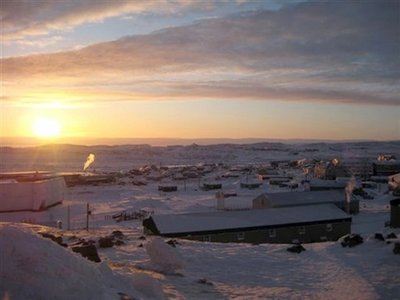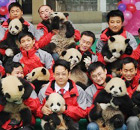Global General
To cool global meltdown, G7 heads deep into Arctic
(Agencies)
Updated: 2010-02-04 10:07
 |
Large Medium Small |
IQALUIT, Nunavut: This Canadian Arctic capital has no stop lights and didn't start naming its streets until a decade ago. Blizzards can last a week or more, and they tend to come very suddenly. So when the financial chiefs of the seven big industrial countries meet here on Friday and Saturday, they'd better have a quick way out.
Iqaluit, population 7,000, may seem an unlikely venue for a G-7 bull session about the global economy, but the host nation chose it in part to underscore a message about sovereignty over its part of the Arctic.
Climate change is altering the Arctic geography by melting ice and creating open waterways, and with them new access to a bonanza of minerals, petroleum and polar shipping routes. This has led to a welter of conflicting claims by Canada's neighbors, including Russia.
|
|
Iqaluit lies on Baffin Island and is the capital of what in 1999 became Nunavut, a Western-Europe-sized chunk of Arctic with a small measure of self-government for the 85-percent Inuit population of 35,000.
Average February temperatures fall to minus 32 degrees Celsius (minus 25 degrees Fahrenheit), and that's not counting wind chill. So the Canadians will give the finance ministers and central bankers of the G-7 governments heavy-duty parkas. That should make for quite a photo op.
Lesser officials will have to paw through their closets for their warmest clothes. And while lodgings are sufficient for the delegations, journalists who couldn't get a hotel room are being lodged in college dorms or with families.
David Phillips, Canada's chief weatherman, forecasts weekend sunshine and calm weather, but the government has contingency plans to move the meeting 2,000 miles (3,200 kilometers) south to Ottawa. Phillips, who calls Iqaluit the blizzard capital of Canada, warns that the weather can turn on a dime.
"I've been in this business for 40-some years. I have 25,000 weather stories about weird, wild and wacky weather, about venues that people just miscalculated about the weather," Phillips said. And he finds the choice of Iqaluit a bit puzzling. "I still scratch my head thinking, well, what was behind this?"
Finance Minister Jim Flaherty acknowledged in an interview with The Associated Press that apart from wanting to showcase the charms of Nunavut (Inuit for "Our Land"), Canada is sending a diplomatic message about a territory that may contain one-fifth of the world's petroleum reserves.
"It's one of our government's priorities, the assertion of our sovereignty in the Arctic," Flaherty said.
Prime Minister Stephen Harper has made the Arctic a priority, pledging to increase Canada's military presence in the Northwest Passage in case enough ice melts to make it a regular Atlantic-Pacific shipping lane. Canada says it owns the passage. The US and others say it's international territory.
Canada and Denmark have staked claims to tiny Hans island at the entrance to the Northwest Passage, and on the other side of North America, the offshore Alaska-Canada border is disputed.
Health Minister Leona Aglukkaq, the first Inuit to sit in a Canadian federal cabinet, also has her eye on geography. "With the interest from my prime minister to develop the north and the interest around sovereignty, it's an ideal location to have a G-7, to show the international community that Canada's Arctic is a part of Canada," Aglukkaq told the AP.
"I think there's a threat to Canada's sovereignty in the Arctic, at least more a threat than it used to be," says Professor Robert Bothwell of the University of Toronto. "We left the Arctic pretty much to its own devices because after all, nobody could get there, nobody really wanted it."
If any armies intrude, Canadian military chief of staff Gen. Walt Natynczyk has quipped, his troops' first priority will be to save them from the weather.
Russia is another player. Russia, Canada, the US, and Denmark have claims before a UN commission to extend their undersea boundaries into ice-blocked areas, and Moscow dramatically staked its claim to the region by planting a flag on the ocean floor at the North Pole in 2007.
Russia sometimes attends the G-7 meetings as an observer, and its officials have privately expressed disappointment at being excluded from the Iqaluit gathering. No explanation was given for not inviting them.
Flaherty, the finance minister, says he hopes to recapture the informal spirit of the G-7's forerunners in the 1970s. He wants to take the US Treasury Secretary and his G-7 counterparts dogsledding, and plans on bringing them together for an intimate, unbuttoned fireside chat.
"It's counterintuitive to go there in the winter time, but it's actually the most beautiful time of the year to go there because it is so spectacular, and I'm looking forward to taking them out dogsledding," he said. "We'll see how many take up the challenge."
The meeting may also tweak environmental nerves, since seal meat is expected to be on the menu. The European Union has banned the import of seal products on humane grounds, whereas Canada says seal-hunting is humane and provides income for isolated communities like Iqaluit.
"I'm hoping it will be served and that people get a taste of what we eat in the north," Aglukkaq said. "Often we are not consulted, or ignored, and people don't understand the fact that it is our way of life."
As for the weather, Iqaluit's Inuit mayor, Elisapee Sheutiapik, says she's not worried.
"We make do and I'm sure they will too," she told The AP. "This will be one of those meetings that they never forget."














